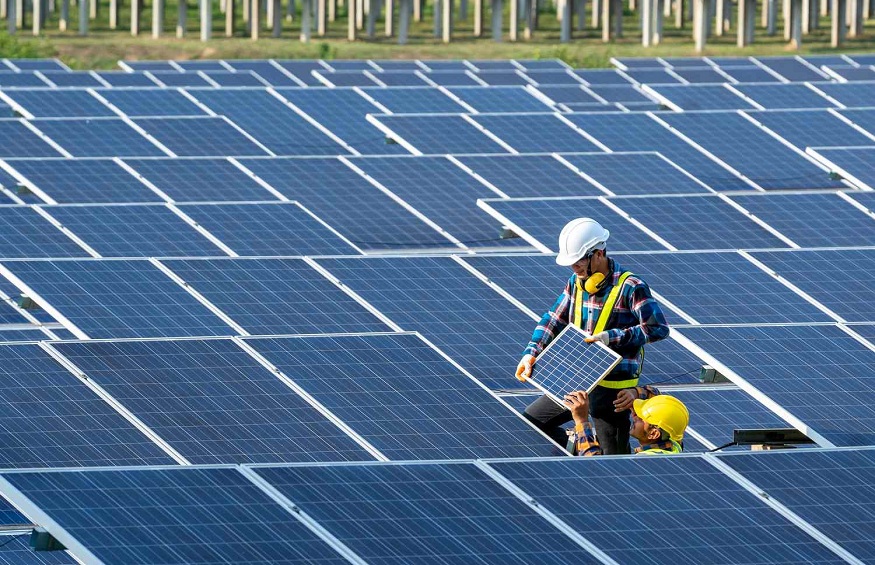When it comes to installing solar panels in Spain, one of the most common questions is about the cost. The cost will depend on various factors, including the type of system you choose and the size of your property. On average, a standard 250W solar panel in 2023 costs around €400-€500. However, it’s important to note that the overall cost will vary based on the complete system’s type and size.
If we consider a typical domestic installation, a 4kW solar panel system, the cost would be approximately €6,400. This system can cover around 29 square meters of your roof. The cost of solar panels has significantly decreased in recent years due to advancements in solar energy technology. In Spain, the amount of solar power generated by private properties increased by 102% in 2021, indicating a growing trend.
Types of Solar Panel Installations
When it comes to solar panel installations, you have two options to choose from, on-grid and off-grid systems. On-grid solar panels are connected to your utility company’s power grid, allowing you to sell any excess energy back to the grid, reducing your costs and monthly energy bills. This is the most popular installation type in Spain. However, it’s important to note that in rural locations, if your utility company experiences a power outage, you will lose all power. – The best solar panel company Malaga has to offer.
On the other hand, off-grid systems are not connected to the utility company’s energy network. With this type of system, any excess energy you generate is stored in an additional battery, which can be used during nighttime or when there is little to no sunlight. Off-grid systems provide more reliability, but the initial cost of setting up such a system is higher.
Why Install Solar Panels in Spain?
The sunny weather in Spain makes it an ideal location for installing solar panels. Even during the winter months, there is enough sunlight to generate electricity and save money on energy bills. Apart from the financial benefits, installing solar panels in Spain allows you to play a part in protecting the planet and reducing your carbon footprint.
While energy subsidies for solar panels in Spain were phased out a decade ago, there are still compelling reasons to install solar panels, including long-term cost savings and environmental sustainability.
How Much Will It Cost to Install Solar Panels in Spain?
The cost of installing solar panels in Spain depends on various factors, such as the system size and type, as well as your specific energy consumption requirements. For a smaller home with two to three bedrooms, a 3kW solar panel system could cost around €5,000 to €6,000. This system would cover approximately 22 square meters of your roof. For medium-sized properties with three or more bedrooms, a 7.5KW system with battery storage could cost around €7,500, including VAT. Larger homes may require a 10KW system or more, with prices starting at €10,000, inclusive of VAT.
It’s important to note that these prices are estimates and can vary based on individual circumstances and the chosen installer. To get a more accurate and personalized quote, it’s recommended to reach out to trusted solar panel installers who can assess your specific needs and provide detailed cost estimates.
Maintenance of Solar Panels
Solar panels require minimal maintenance to ensure optimal performance. It is recommended to clean the panels between two and four times per year. This can be done by running a hose over them or using a leaf blower to remove any debris. Rainwater typically helps in keeping the panels clean, but during dry spells, manual cleaning may be necessary. Solar panels are designed to withstand extreme weather conditions, including snow, rain, hail, and high temperatures.
Savings with Solar Panels
With the rising energy costs in Spain, installing solar panels can help you save money on your energy bills. The amount of savings will depend on various factors, including your energy consumption, the amount of sunlight your panels receive, your electricity tariff, and the installation costs. On average, a family living in a 120 sqm property with four members and their own independent solar panel installation can expect to save around €1,684 per year or €8,420 over five years. In many cases, the initial installation cost of the panels can be recovered within five years.
Components and Materials Used in Solar Panels
Solar panels consist of various components and materials, each playing a crucial role in converting solar light into usable electricity. The main component material used in solar panels is crystalline silicon, which is responsible for creating semiconductors. Monocrystalline and polycrystalline solar panels use crystalline silicon wafers, while thin-film solar panels use amorphous silicon.
In addition to silicon, solar panels are composed of glass, an anti-reflective coating, plastic or polymer frames, and wiring. These components work together to protect the sensitive solar cells, allow the passage of light, and provide installation support.
Solar Panels and Energy Independence
While solar panels can generate electricity for your home, it’s important to note that they may not be able to power your entire house exclusively with solar energy. The average home in the UK consumes around 2,900 kWh of electricity per year, and the energy requirements vary based on the number of occupants and the types of appliances used. Solar power is typically generated during the day, which may not align with the peak energy consumption periods in households.
To ensure a continuous energy supply, solar-powered households may need to rely on energy stored in batteries during periods of low sunlight or at night. By optimizing energy usage and incorporating battery storage systems, solar panels can contribute to reducing reliance on the grid and increasing energy independence.
Grants and Subsidies for Solar Panels
In Spain, there are direct grants available to incentivize the installation of self-consumption and storage units, both for businesses and individuals. These grants are aimed at promoting renewable energy adoption and are scheduled to be available until December 2023. This presents an excellent opportunity to install solar panels in your home and benefit from the available subsidies. It’s important to stay updated with the latest information and consult with trusted installers to take advantage of these programs.
Installing solar panels in Spain can provide numerous benefits, including cost savings, environmental sustainability, and energy independence. With the decreasing cost of solar panels and the availability of grants and subsidies, now is a great time to explore solar energy for your home. By harnessing the power of the sun, you can reduce your reliance on fossil fuels, lower your energy bills, and contribute.

